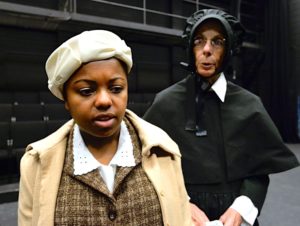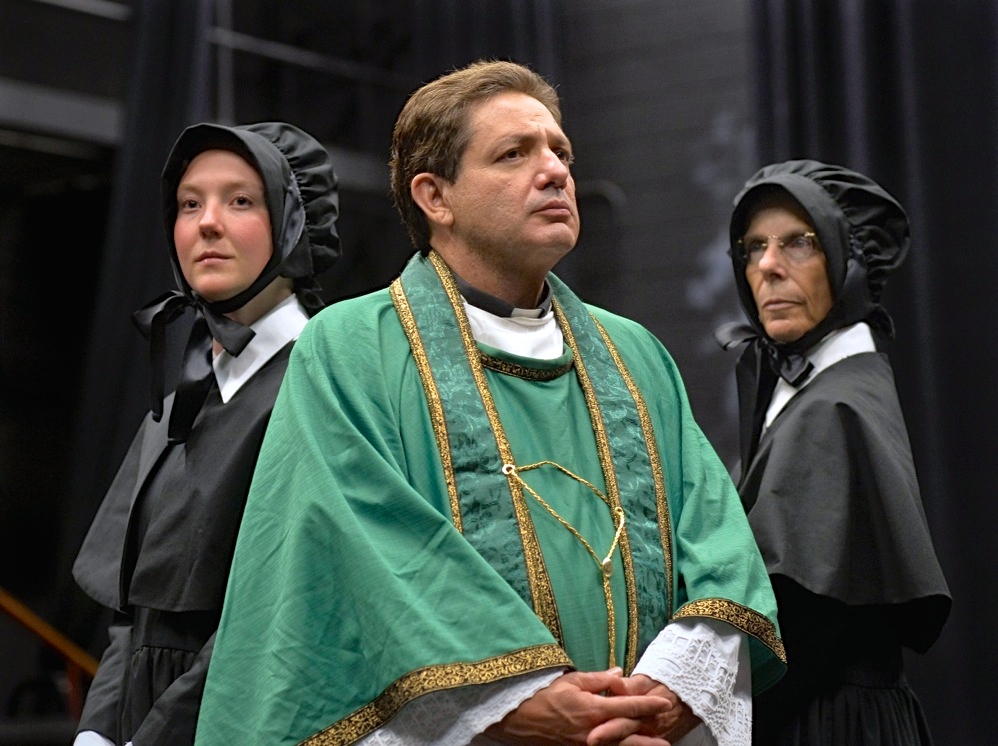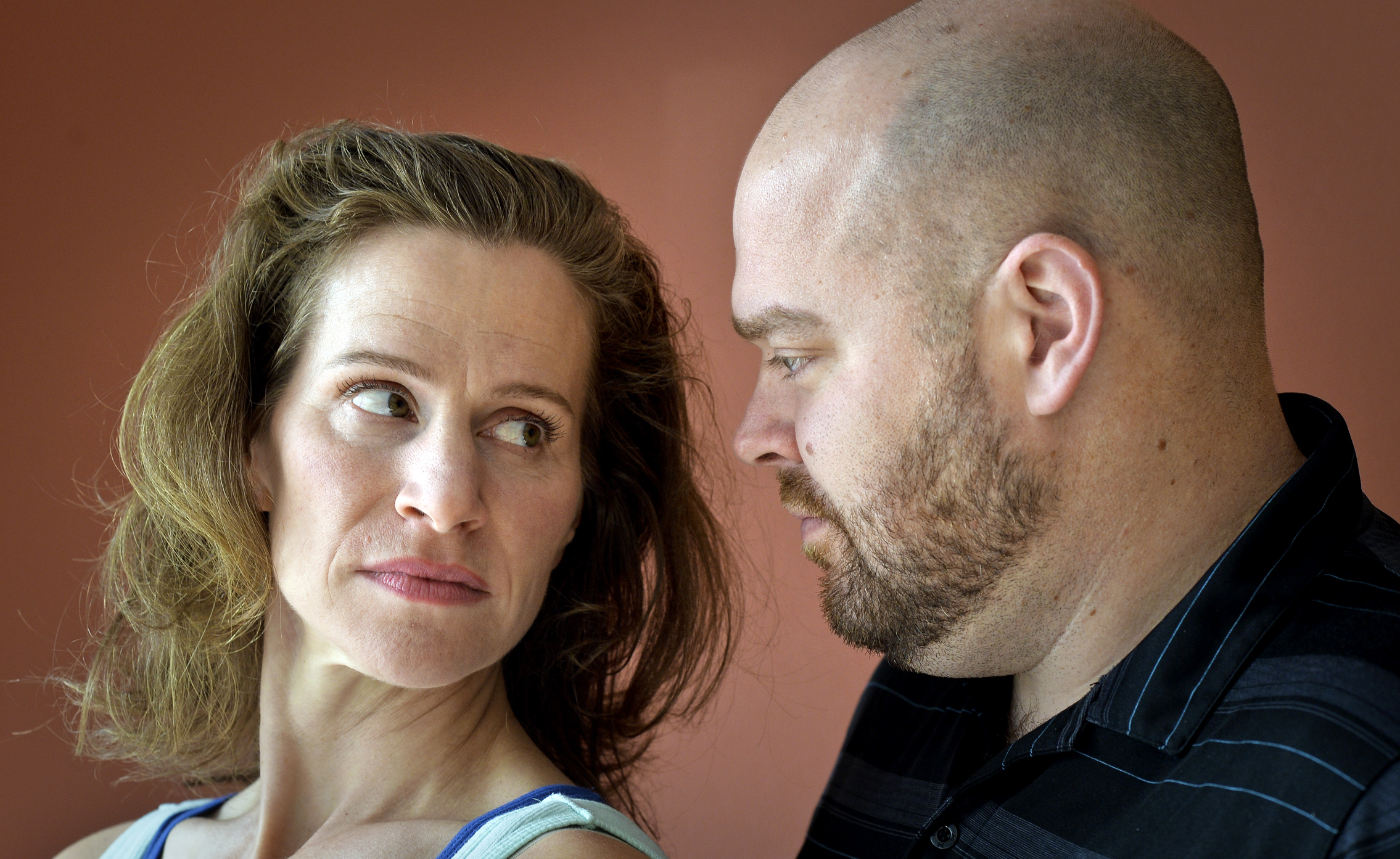(Above: Hailey Henderson, Chris Pinto and Rebecca Nachison play in “Doubt,” by Pulitzer Prize-winning playwright John Patrick Shanley; photos by Paul Carter)
By Randi Bjornstad
In an extensive profile in the New York Times 13 years ago, when John Patrick Shanley’s play, “Doubt,” was about to have its off-Broadway debut in New York, the playwright told writer Alex Witchel that he based the plot — about a priest accused of molesting a teenage boy in his parish — on a family story about a young relative being molested by a priest who was never punished, but in fact was reassigned to another church and actually promoted.
It might seem logical, then, that Shanley would write his play from a jaundiced point of view when it comes to the possible innocence of a priest so accused, but that’s not the way he approached it.
In fact, the name he gave his play, “Doubt” — the full title is “Doubt: A Parable” — in no way negates the reality of his relative’s experience, but it also interjects the possibility of misinterpreting the efforts of some well-meaning clergy who try to help troubled youth.
Shanley based his insight on his own experience as a child growing up in Roman Catholic-affiliated schools, where the kindness of several teachers to a boy of his difficult, even abusive background, easily could have been misconstrued as something far more sinister.
As he explained in the earlier interview, “It was the homosexual teachers for the most part who saved me,” recalling one in particular who became his “friend and protector.”
“Did he have his reasons for being interested in me? Everybody has their reasons,” Shanley said. “Passion fuels many things, and it’s used in many ways.” But, he added, “Many of these people never cross the line.”
That, in a nutshell, is the plot of “Doubt,” which will be onstage in The Studio at the Hult Center for the Performing Arts for six performances from Aug. 18 to 27.
The cast of four includes Chris Pinto, founder of the Not Ready for Retirement Players, as Father Flynn, a parish priest who is accused by Sister Aloysius, the principal of the parish school, of sexual misconduct with an eighth-grade boy who was the first African-American student at the school.
Longtime Eugene actor Rebecca Nachison plays Aloysius, who accosts Flynn with her suspicions in front of an impressionable young nun, Sister James, played by Hailey Henderson, who is thrown into turmoil by the accusations against the beloved priest by his harsh and unrelenting critic.

Samira Lobby, left, plays the mother of student Donald Muller, believed by Sister Aloysius, acted by Rebecca Nachison, to have been molested by the priest of the parish
Aloysius rejects Flynn’s explanation, that he found the teenager, Donald Muller, illicitly drinking the altar wine and decided to discipline the boy personally while at the same time protecting him from harsher punishment, should others learned of his infraction. Instead, she contacts the boy’s mother, played by Samira Lobby, and tries to enlist her in her suspicions.
Mrs. Muller, however, said she has no such suspicions about Father Flynn and above all does not want to jeopardize her son’s remaining time at the school, after which he will be going on to high school. She also hints that her son might be gay, and that his father might be beating him because of his own suspicions about the boy’s sexual orientation.
The rest of the play chronicles the ongoing battle between the priest and the nun, and finishes with a lack of evidence either to condemn or exonerate him.
It’s an end that deeply satisfies the cast, starting with Pinto.
“When you read this play or see this play, you come away with no idea of the truth,” he said. “That’s definitely the way I’m playing it.”
Pinto said he deplores the tragedy of all of the victims of aberrant priests that have been revealed during the past several decades, but like Shanley, he also can see how innocent men could have been caught up in the zeal for punishment.
“I had a priest in high school — Fr. Ted Lay — who was the one who got me interested in theater,” Pinto said. “He recommended that I try out for a play, it was ‘Up the Down Staircase,’ and he called the director and said he had this kid who really needed to be in that play.
“I use (Lay) as an example of someone who also could have been misinterpreted,” he said. “I remember once he said about one boy, ‘I wish I could give him a big hug — that’s what he really needs’ — but that kind of innocent remark could be enough to destroy someone’s life.”
However, despite the focus on the Roman Catholic church, the concept examined in “Doubt” have equal relevance in society as a whole, Pinto said.
“It also goes to the idea of malicious gossip — there’s a wonderful piece in the script about gossip, which can be so devastating and once put out there can’t be taken back or even controlled,” he said.
“It’s about the fact that so many people look for things to justify their own beliefs, even though there is no evidence and what they believe can absolutely ruin others. Some people don’t care about truth, just their own beliefs and words. And words matter.”
Nachison confronted that issue in her portrayal of Sister Aloysius in “Doubt.”
“It’s a role I’ve wanted to play for a long time,” she said. “She is such a complex character, with so much nuance. What made her unable or unwilling to even consider Fr. Flynn’s explanation? I believe when she started to have a bit of doubt enter her soul, it was bigger than whether the priest had done something wrong, it had to do with her entire life.”
In order to play Aloysius, Nachison did what she always does to prepare for challenging roles, “to find something in them that is also in me, something I can empathize with.”
With this role, “There was no kind of background that I could share,” she said. “Sister Aloysius was Catholic. Both my parents were Jewish. I am married to someone from a Catholic background but not practicing.”
So she did research to find out about the Sisters of Charity, and she looked at the time period when the play was written.
“It took place in 1964 in the Bronx, so I imagined first what it was like for her as a woman in that time,” Nachison said. “She was married, her husband died in World War II, and it was after that she entered the convent. There weren’t very many options for women back then — teaching, nursing, or for her, the convent.”
The lack of choice gave Nachison a clue to her character as Sister Aloysius, starting with “a desperate need to be certain about things.”
“Why didn’t she have children? Or did she have a child, maybe, who died? As an actor, I had to come up with that history in order to give the role my own interpretation,” she said. “Other actors might come up with something different, and that’s what’s wonderful about seeing different people taking on a role.”
The original actress in the off-Broadway production of “Doubt” was Cherry Jones, “and I have never seen her portrayal,” Nachison said. “I would hope that as brilliant as she is, I might bring something different to the role.”
The younger women in the cast, Henderson and Lobby, also have strong feelings about the play.
Lobby, who plays Donald Muller’s mother, said she was shocked at first about the reaction of her character to Sister Aloysius’ accusations.
“I was taken aback by the mom was reacting, just wanting to get her son through school and on to high school — I was having an ethical battle with myself,” Lobby said. “But when I looked at what was going on at that time and in her life, I understood. She already knew her son was gay and that he was being mistreated by her husband, so her main goal was to get him through to the next phase in his life.”
As for Henderson, “I think people need to come with the idea that they may be asked to think about what they doubt in their own lives,” she said.
“The audience will have to be curious. People will say, ‘Did he do it?’ and I will say, ‘I don’t know.’ “
Doubt: A Parable
When: 7:30 p.m. on Aug. 18-19 and 25-26; and 2 p.m. on Aug. 20 and 27
Where: The Studio, Hult Center for the Performing Arts, Seventh and Willamette streets in downtown Eugene
Tickets: $23 general admission; $20 senior citizens and students, available at the box office, 682-5000, or online at hultcenter.org/








